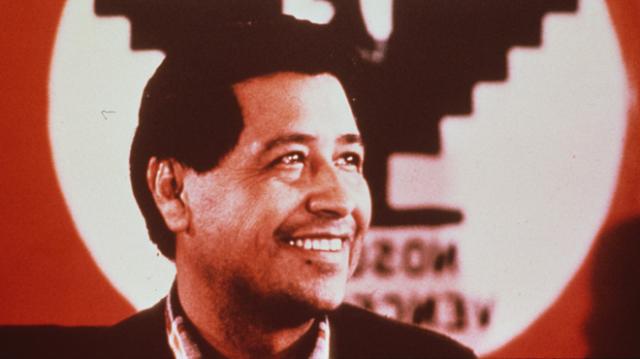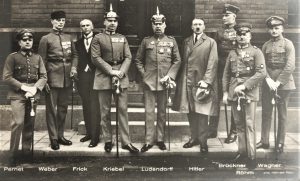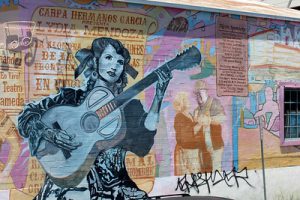Cesar Chavez is a very famous Mexican-American labor leader. He inspired many agricultural workers to stand up and face problems in the work force. Chavez led a series of peaceful protests and strikes to help migrant workers get higher pay, and started a labor movement. The actions that Cesar Chavez took called for national attention. With his relentless attitude, he led many Mexican-Americans to speak up, and to stand up for themselves and the rights that they deserved.
Cesar Chavez was born on March 31, 1927 in North Gila Valley, Arizona. At the age of 10, Chavez’s family had lost their family farm and small grocery store due to the chaos of the Great Depression. Without their farm and family-owned grocery store Chavez’s family had no financial income and were forced to join the migrant farm workers.1 When Cesar was fourteen, his father was in an automobile accident that impeded him from working, so Cesar Chavez felt the need to help his family by working in the fields and postponing his high school education for two years.2 Of course the two years became long forgotten because by the age of 17 Cesar Chavez had enlisted in the U.S. Navy. Chavez served in the Navy for two years before being discharged. Chávez described these two years as the worst years of his life.

Neither his mother nor his father wanted him to enlist in the Navy, but he knew he either had to enlist or get drafted. Instead of being drafted into the Army, he enlisted in the U.S. Navy. His work in the Navy consisted of being a deck hand and crew transport. Chavez was never engaged in combat throughout his two years of service. In a seventy-two-hour pass that Chavez and his navy friends received, they returned to Texas and attended a movie theater. Movie theaters were segregated at that time and “it was just accepted by the Mexicans” that they were to sit “in the quarter-section on the right [of the theater].”3 Chavez felt that he should not have to accept such discrimination, so he sat on the left of the theater. A scandal erupted. Chavez was asked to move back to the right of the theater and when he refused, he was sent to jail. Chavez recalls that the sergeant did not know what to charge him with and started to make phone calls to help him figure out what charges to put on Chavez. Chavez could hear the conversations about charging him with “disturbing the peace” and “being drunk.” After about an hour of deliberation with judges, chief of police, and his fellow police officers, the sergeant lectured Chavez and let him go, but not before threatening to put him in jail for life. This was the first time that Chavez had challenged rules discriminating against him due to his race, but it surely would not be the last.4
When his two years of service up, Chavez returned to work in the fields once again and in 1948 he married Helen Fabela.5 It was shortly after this that Cesar created his credit union with Dolores Huerta, a fellow worker at the Community Service Organization (CSO) that continuously encouraged him to organize farmworkers in order to help them. They would loan money out and help people of all ethnicities.

Since hundreds of people would show up to Chavez’s house because of his credit union, many of the anglos in the area started accusing them, Huerta and Chavez, of being communists, trying to bring an end to the union. Policemen would come in and try to disperse those attending, but Chavez knew the law and knew that they would not be able to put the union down.6 Cesar Chavez and all of those associated with him began being called communists. It was all over the newspapers, and back then the newspaper had a lot of influence on the community. Because of this label, people began disassociating themselves with Chavez due to fear.7
About three years after the start of the credit union, Chavez began his famous strikes, boycotts, and his 25 day fast. Chavez knew he was in for a long ride when he decided to start helping his fellow farm workers. There would be many moments of despair and even more times of joy and excitement.
- Salem Press Biographical Encyclopedia, s.v. “César Chávez,” by Cecilia M. Garcia. ↵
- Jacques E. Levy and Cesar Chavez, Cesar Chavez : Autobiography of La Causa (New York : Norton, 1975.), 73. ↵
- Levy and Chavez, Cesar Chavez : Autobiography of La Causa, 84-85. ↵
- Levy and Chavez, Cesar Chavez : Autobiography of La Causa, 84-85. ↵
- Salem Press Biographical Encyclopedia, s.v.“César Chávez,” by Cecilia M. Garcia. ↵
- Cesar Chavez, directed by Diego Luna (Santa Monica, CA : Lionsgate, 2014), DVD. ↵
- Levy and Chavez, Cesar Chavez : Autobiography of La Causa, 107. ↵



48 comments
Ana Cravioto Herrero
This was a great article and it was very interesting learning about Cesar Chavez. I had heard a little bit about him before, but I did not know to what extent he made an impact. He is a very inspirational person and I am glad that there are people in the would like him that do not let discrimination and racism bring them down, rather they stand up to it and make a difference.
Mauro Bustamante
It’s sad to see how people are treated based on their race, and it’s horrible to still see it happening today. I think that Chavez was someone that opened the doors for many other minorities to stand up for themselves and demand equality. Cesar Chavez is an inspirational figure for Mexican Americans and to other immigrants from different countries. I was impressed on the fact that he had strength to fight for his rights while still going though all the disrespect and discrimination at the time. this article was inspirational and very informative, it was well written and a great read.
Mariana Gutierrez
I still remember learning about Cesar Chavez in my U.S. History class back in high school, and I was so impressed at how much determination he had for fighting for his rights, as well as for his fellow agricultural workers. It’s sad to see how people are treated based on their race, and it’s horrible to still see it happening today. What surprised me the most, was never knowing about the first time he challenged the law, and it being due to a theater incident. I also never knew that he enlisted in the U.S. Navy, which is very helpful to know now.
Rosario Moreno
I never heard the story about his first time questioning the law. That short part about the movie theater really says a lot and I am glad you included it. I loved reading the part about how Anglos were calling them communist so the cops would come, but Chavez knew that law. That part made me smile,because he knew to learn the law so that way no one could abuse it. Great article, can’t wait to read part II.
Esperanza Rojas
I am very glad this article includes the many things Cesar Chavez did for the Hispanic movement. People only know him for his strikes and boycotts for the farm workers, but many don’t know about his credit union bad how he helped many ethnicities other than hispanics. I didn’t know that he started to resist many laws against segregation from when he was younger, nor did I know about the theater incident.
Indhira Mata
Cesar Chavez is an inspirational figure for Mexican Americans and to other immigrants from different countries. His work started in California, but inspired many other places to do the same. Many people don’t happen to stand up for themselves against policemen, but he did. This showed he was a determined leader. He didn’t just help Hispanics, he helped everyone who needed it no matter their origins. This helped his cause in the long run with the support of many people. He is absolutely amazing and make me start to things of ways how I can also make a similar impact.
Daniela Martinez
I was familiar with the work Chavez had done with the Labor union and how he advocated for migrant farm workers to have better working conditions and better pay. However, I didn’t know that Chavez served in the US Navy and that he was previously almost charged for standing up against segregation. I think that Chavez was someone that opened the doors for many other minorities to stand up for themselves and demand equality. Chavez was an icon to many Mexican- Americans at the time as he did so much to improve the community.
Gabriela Ochoa
I have read and heard many things about Cesar Chavez but never heard about his earlier years.The article did a great job at explaining the segregation that happened for Hispanics and how he was willing to fight for his rights. I never knew that he was in the Navy and had been discharged because he took a stand. Overall, it was a really great article.
Didier Cadena
It was great to be able to read about the early part of Chavez’s life, because I am not familiar with that part of his life. I was not aware that he enlisted in the Navy and how he got in “trouble” in it. The article does a great of putting the information of his early life together and still make it interesting enough to read.
Alexandra Cantu
I knew a little about Cesar Chavez but I definitely knew about his strong character. He stood up for what believed in and put his voice out there for the community to hear and see what was wrong. I liked how this article focused on his upbringing. Im really intrigued to read part II. this was such a great written article! As a hispanic I love to read more about individuals who fought and who continue to fight to make a difference in tis world.